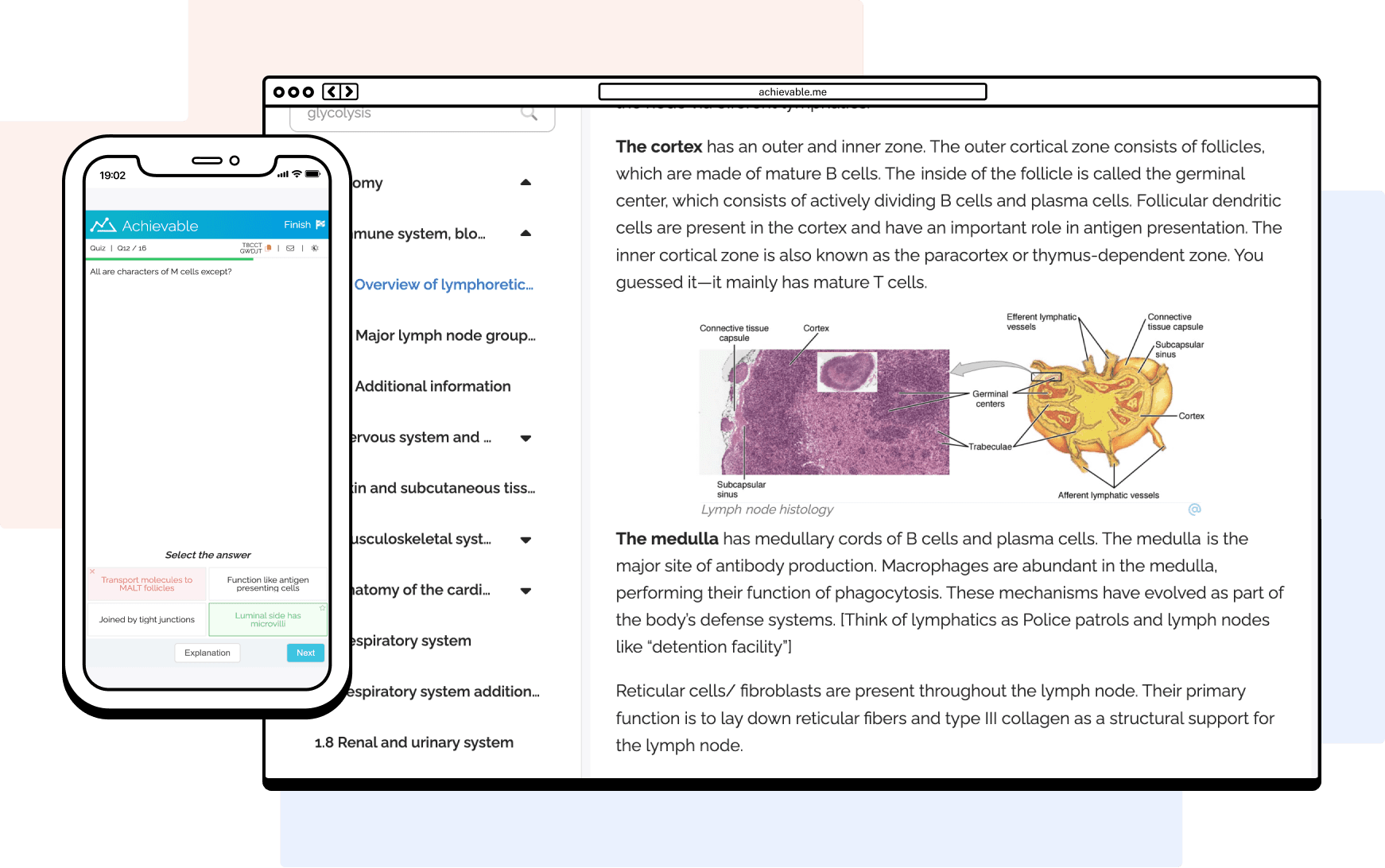
USMLE Step 1Exam information
What it is, what's tested, and how it's scored.

USMLE/1 exam details
The USMLE Step 1 is a comprehensive overview of the medical field, and is the first required exam for a National Board of Medical Examiners (NBME) license.
The USMLE/1 exam is hosted by USMLE and costs $660 to register. Participants have 8 hours (7x60min) to answer Approximately 280 multiple-choice questions.

NBME's USMLE/1 exam summary
Step 1 test content specifications
[^1] The General Principles category for the Step 1 examination includes test items concerning those normal and abnormal processes that are not limited to specific organ systems. Categories for individual organ systems include test items concerning those normal and abnormal processes that are system-specific.
System
Range (%)
General Principles
12-16
Blood & Lymphoreticular/Immune Systems
7-11
Behavioral Health & Nervous Systems/Special Senses
9-13
Musculoskeletal, Skin & Subcutaneous Tissue
6-10
Cardiovascular System
5-9
Respiratory & Renal/Urinary Systems
9-13
Gastrointestinal System
5-9
Reproductive & Endocrine Systems
9-13
Multisystem Processes & Disorders
6-10
Biostatistics & Epidemiology/Population Health
4-6
Social Sciences: Communication and Interpersonal Skills
6-9
Step 1 physician tasks / competencies specifications
Competency
Range (%)
Medical Knowledge: Applying Foundational Science Concepts
60-70
Patient Care: Diagnosis
- History / Physical Examination
- Diagnosis
20-25
Communication and Interpersonal Skills
6-9
Practice-based Learning & Improvement
4-6
Step 1 discipline specifications
Discipline
Range (%)
Pathology
44-52
Physiology
25-35
Pharmacology
15-22
Biochemistry & Nutrition
14-24
Microbiology
10-15
Immunology
6-11
Gross Anatomy & Embryology
11-15
Histology & Cell Biology
8-13
Behavioral Sciences
8-13
Genetics
5-9

Achievable USMLE/1 content outline
1
Anatomy
An exam-focused, comprehensive review of anatomy organized according to organ systems. Includes essential topics derived from the USMLE content outline and helps you apply anatomy concepts to clinical scenarios like nerve injuries, localization of lesions, etc.
2
Microbiology
A review of general and systemic microbiology focused on laboratory diagnosis and clinical features of infectious diseases. Includes a detailed description of high yield topics like antimicrobial resistance, classification of viruses, and bacterial toxins.
3
Physiology
A detailed, organ system-wise review of physiology with exam-oriented descriptions of fundamental mechanisms and factors affecting the functions of the human body. Clarify concepts on one of the most heavily tested subject areas for USMLE step 1 system-wise, including the functioning of the special senses.
4
Pathology
A comprehensive review of pathology, the most highly tested subject for the USMLE Step 1. Includes general and systemic pathology, important biopsy, radiology, and laboratory findings. Clinical features are explained to help solve clinical vignettes.
5
Pharmacology
A high yield review of general and systemic pharmacology, including pharmacodynamics, pharmacokinetics, important drugs, and adverse effects. Detailed explanations with graphs, receptor interactions, and newer chemotherapeutic agents.
6
Immunology
Covers basic concepts and application of immunology, including the development of immune cells, the functioning of the immune system, and immunodeficiency disorders. Includes dedicated units to highly tested topics of transplant rejections and blood transfusion reactions.
7
Biochemistry
Learn the various biochemical and metabolic pathways and the disorders that result from congenital or acquired defects that affect these pathways. The comprehensive review includes clinical and diagnostic characteristics of metabolic disorders to score higher on your exam.
8
Cell and molecular biology
Covers fundamental concepts of cell biology such as nuclear structure and organization, transcription and translation, and cellular signaling pathways. It also includes high yield concepts on the cell biology of cancer.
9
Biostatistics and epidemiology
Review with examples to understand exam-oriented, simplified concepts on biostatistics, and epidemiology. Includes a section on ethics and doctor-patient relationships.
10
Genetics
Learn common terminologies, inheritance patterns, and important genetic disorders. Focuses on the heavily tested application of genetic principles to calculate the risk of inherited genetic disorders, Hardy Weinberg equation, and LOD score.
11
Behavioral science
A comprehensive review of various psychiatric, developmental, and substance use disorders. Pharmacotherapy of psychiatric disorders is discussed along with the respective conditions.

Pass the USMLE/1. Guaranteed.
Achievable is the best online USMLE Step 1 exam prep course: effective, personalized, and convenient. With Achievable, you'll spend less time studying and pass your exam the first time, or your money back.